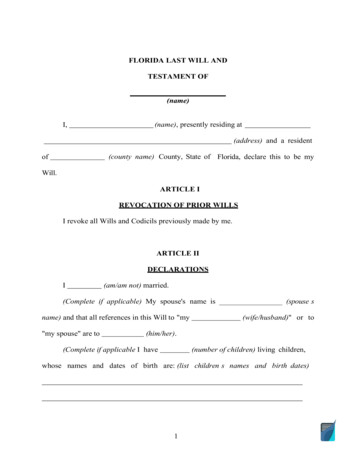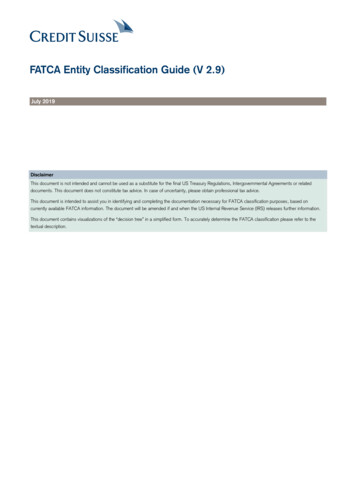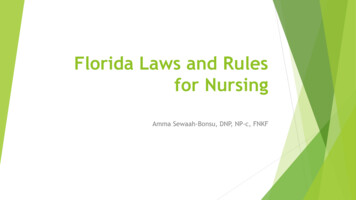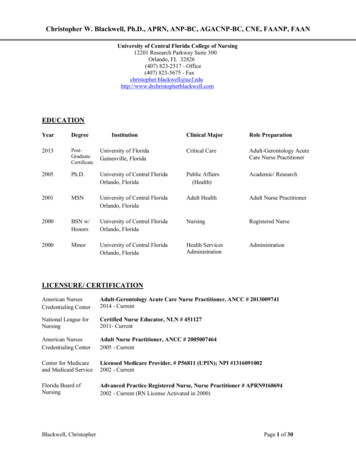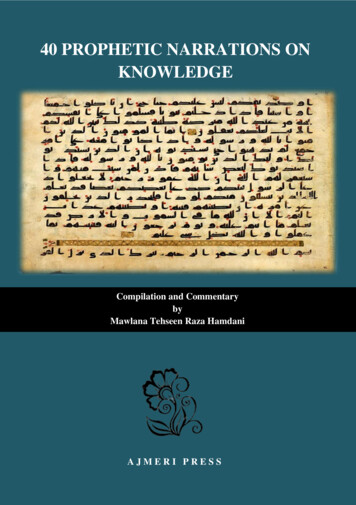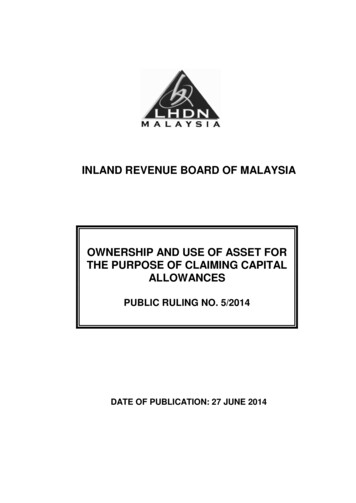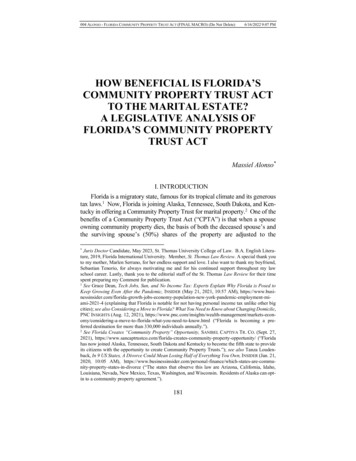
Transcription
004 ALONSO - FLORIDA COMMUNITY PROPERTY TRUST ACT (FINAL MACRO) (Do Not Delete)6/16/2022 9:07 PMHOW BENEFICIAL IS FLORIDA’SCOMMUNITY PROPERTY TRUST ACTTO THE MARITAL ESTATE?A LEGISLATIVE ANALYSIS OFFLORIDA’S COMMUNITY PROPERTYTRUST ACTMassiel Alonso*I. INTRODUCTIONFlorida is a migratory state, famous for its tropical climate and its generoustax laws.1 Now, Florida is joining Alaska, Tennessee, South Dakota, and Kentucky in offering a Community Property Trust for marital property.2 One of thebenefits of a Community Property Trust Act (“CPTA”) is that when a spouseowning community property dies, the basis of both the deceased spouse’s andthe surviving spouse’s (50%) shares of the property are adjusted to the*Juris Doctor Candidate, May 2023, St. Thomas University College of Law. B.A. English Literature, 2019, Florida International University. Member, St. Thomas Law Review. A special thank youto my mother, Marlen Serrano, for her endless support and love. I also want to thank my boyfriend,Sebastian Tenorio, for always motivating me and for his continued support throughout my lawschool career. Lastly, thank you to the editorial staff of the St. Thomas Law Review for their timespent preparing my Comment for publication.1See Grace Dean, Tech Jobs, Sun, and No Income Tax: Experts Explain Why Florida is Posed toKeep Growing Even After the Pandemic, INSIDER (May 21, 2021, 10:57 AM), miami-2021-4 (explaining that Florida is notable for not having personal income tax unlike other bigcities); see also Considering a Move to Florida? What You Need to Know about Changing Domicile,PNC INSIGHTS (Aug. 12, 2021), u-need-to-know.html (“Florida is becoming a preferred destination for more than 330,000 individuals annually.”).2See Florida Creates “Community Property” Opportunity, SANIBEL CAPTIVA TR. CO. (Sept. 27,2021), unity-property-opportunity/ (“Floridahas now joined Alaska, Tennessee, South Dakota and Kentucky to become the fifth state to provideits citizens with the opportunity to create Community Property Trusts.”); see also Tanza Loudenback, In 9 US States, A Divorce Could Mean Losing Half of Everything You Own, INSIDER (Jan. 21,2020, 10:05 AM), ce (“The states that observe this law are Arizona, California, Idaho,Louisiana, Nevada, New Mexico, Texas, Washington, and Wisconsin. Residents of Alaska can optin to a community property agreement.”).181
004 ALONSO - FLORIDA COMMUNITY PROPERTY TRUST ACT (FINAL MACRO) (Do Not Delete)182ST. THOMAS LAW REVIEW6/16/2022 9:07 PM[Vol. 34property’s fair market value at the date of the decedent spouse’s death.3 Thissort of tax adjustment is referred to as a “double step-up in basis,” and as longas the community property has appreciated, it results in a tax benefit for thebeneficiary of the property.4An analysis of Florida’s CPTA reveals that it is misleading in several ways.First, it gives estate planners the option to make the trust irrevocable; however,if a married couple were to place their homestead property in an irrevocabletrust, they would lose their homestead exemption which affects the way theproperty is taxed.5 Second, if one spouse dies and the surviving spouse is a noncitizen of the United States, and the decedent left their property to the survivingnon-citizen spouse, that spouse is now subject to gift taxation rates as applicableto non-citizens under the Internal Revenue Services (“IRS”) code.6 Lastly, thisnew legislation does not clearly state whether the assets used to fund the trustwould be classified for tax-exempt purposes.7This Comment will analyze the Florida Community Property Trust Act byclosely evaluating the statute itself.8 Part II will offer background informationon the CPTA, including definitions of essential terms.9 Part III, section A, willanalyze the risk of providing an irrevocable trust as an option for homestead3See Osvaldo Garcia & Jennifer Wioncek, Florida’s Proposed Directed Trust and CommunityProperty Trust Statutes: What You Need to Know, BILZIN SUMBERG – JD SUPRA (Apr. 21, proposed-directed-trust-and-1350125/ (explainingthat this is authorized pursuant to the Internal Revenue Code); see also Matthew Tuller, How aCommunity Property Trust Could Save You From Heavy Taxation, L. OFF. OF MATTHEW J. TULLER(Sept. 23, 2019), ation (“Because of a tax loophole, community property receives abasis adjustment step-up on the entire property when one of the spouses dies.”).4See Garcia & Wioncek, supra note 3 (explaining that this tax treatment is superior to ownershipof real property as joint tenants because only one spouse’s half interest receives a step-up in basis“resulting in a large tax burden upon disposition of the asset.”); see also Will Kenton, Step-up inBasis, INVESTOPEDIA, (Aug. 20, 2021), .asp(explaining that step-up in basis taxation has often been used by the rich as loophole to minimizetheir tax burden).5See FLA. CONST. art. X, § 4 (stating that a natural person must own the homestead property); seealso Karen Rogers, Homestead Exemption in Regard to Living Trusts, ZACKS, rd-living-trusts-11539.html (last visited May 9, 2022)(explaining that the homestead exemption remains with the owner and the exemption may be lostwhen placed in a trust).6See Garcia & Wioncek, supra note 3 (“If one such spouse is not a United States citizen, then thecontribution of separate property by the other spouse would not qualify for the unlimited maritaldeduction benefit and could trigger a U.S. federal gift tax situation.”); see also 26 U.S.C. § 2056(d)(2020) (stating that if the surviving spouse is not a United States citizen, a martial deduction isimpermissible).7See Garcia & Wioncek, supra note 3 (“However, there has been debate within the tax field (withoutan ultimate consensus), as to whether community property trusts settled in a non-community property state such as Florida are, in fact, entitled to the double basis adjustment.”); see also Comm’r ofInternal Revenue Serv. v. Harmon, 323 U.S. 44, 48 (1944) (holding that an Oklahoma statute allowing couples to opt-in to a community property regime could not be recognized for federal incometax purposes).8See infra Parts I–IV.9See infra Part II.
004 ALONSO - FLORIDA COMMUNITY PROPERTY TRUST ACT (FINAL MACRO) (DO NOT DELETE)2022]FLORIDA’S COMMUNITY PROPERTY TRUST ACT6/16/2022 9:07 PM183property and offer a novel solution that proposes an amendment to the CPTA toeliminate irrevocable trusts.10 Part III, section B, will analyze the issue of devising property to a non-citizen spouse for tax purposes and propose a tax exemption for non-citizen spouses with a community property trust.11 Part III,section C, will analyze the uncertainty regarding how the IRS will treat community property trusts settled in a non-community state and will recommendclarity in the law as it refers to this issue.12 Part IV will state the novel solutionsproposed for each critique.13 Lastly, part V will summarize the analysis donethroughout the comment and conclude.14II. BACKGROUNDOn July 1, 2021, Florida adopted Florida’s Community Property Trust Act(“CPTA”).15 The CPTA allows married couples to form a community propertytrust and fund it with the marital property treated as community property.16 Thisnew legislation “gives the settlor spouses broad discretion to structure the trustas they wish, including determining whether the trust shall be revocable or irrevocable and how the trust property shall be disposed upon death or divorce.”17Another advantage of the CPTA is that the settlor spouses do not have to live inFlorida; only the Trustee must.18 However, the ultimate benefit of the CPTA ishaving all the property in the trust receive a step-up based on the fair marketvalue at the time of death of the first spouse and second spouse.1910See infra Part III.See infra Part III.12See infra Part III.13See infra Part IV.14See infra Part V.15See FLA. STAT. § 736.1502(2) (2021) (“‘Community property trust’ means an express trust thatcomplies with s. 736.1503 and is created on or after July 1, 2021.”); see also Karen Kayes, The NewRules of Florida Trusts Are Here, WARNER NORCROSS JUDD (Aug. 30, lorida-Trusts-Are-Here (noting that the Florida Community Property Trust Act becameeffective on July 1, 2021).16See Kayes, supra note 15 (“[T]he CPTA essentially allows couples to opt into a community property situation by creating a community property trust (CPT) and treating property that is transferredto the trust as community property.”); see also FLA. STAT. § 736.1502(1) (defining communityproperty as “the property and the appreciation of and income from the property owned by a qualifiedtrustee of a community property trust during the marriage of the settlor spouses. The propertyowned by a community property . . . shall be deemed to be community property[.]”).17Garcia & Wioncek, supra note 3 (noting that a surviving spouse may amend the trust with respectto their half without regard for whether the trust is irrevocable or revocable); see also FLA. STAT. §736.1504(1)(d) (2021) (explaining how the settlor spouses may use the CPTA, specifically that itcan be formed as either a revocable or irrevocable trust).18See Kayes, supra note 15 (clarifying that the spouses do not have to be domiciled in Florida inorder to create a CPTA within the state); see also FLA. STAT. § 736.1505(1) (2021) (“Whether both,one, or neither is domiciled in the state, settlor spouses may classify any or all of their property ascommunity property by transferring that property to a community property trust[.]”).19See Alan Gassman, Florida Community Property Trust, ATL. WEALTH PARTNERS (June 18,2021), rty-trusts/ (explaining that for mostmarried couples, the sole benefit of having a community property trust is for purposes of the double11
004 ALONSO - FLORIDA COMMUNITY PROPERTY TRUST ACT (FINAL MACRO) (Do Not Delete)184ST. THOMAS LAW REVIEW6/16/2022 9:07 PM[Vol. 34Community property is governed by statutory and judicial laws that havedeveloped in community property states.20 The IRS is one of the central governing bodies with respect to community property, and it describes communityproperty as “(1) property that one or both spouses acquire during their marriage(or domestic partnership) while residing in a community property state, (2)property the spouses agreed to convert from separate property to communityproperty, or (3) property that simply cannot be deemed separate.”21 It is important to note that upon the death of the first spouse, the deceased spouse’sinterest in the community property does not pass automatically to the survivingspouse; instead, the testator must explicitly devise it to the surviving spouse ifthat is their wish.22 Notably, one of the most significant advantages of owningcommunity property is its double step-up in basis taxation, which essentially reevaluates each spouse’s share of the property at the time of their death.23A. BACKGROUND ON DOUBLE STEP-UP IN BASISWhen an asset receives a step-up in basis, the asset’s value has been readjusted to the fair market value when it passes from its owner to its heir.24 Typically, the asset’s value will be higher at the time of inheritance than at the timeof purchase, so the step-up in basis allows the beneficiary to minimize capitalgains tax.25 Now, a double step-up in basis simply means that the asset willstep-up in basis); see also Tuller, supra note 3 (commenting that “[o]ne of the best parts of estateplanning is that you get out so much more than you put in.”).20See Richard B. Toolson, Phd, CPA, Our Greatest Hits Community Property Step-Up in Basis,CPA J. (Aug. 2017), s-community-propertystep-basis/ (explaining that not having one governing body of law means that tax planners need toexamine the statutes and case law of the individual state); see also Terrance J. Mullin, Understanding the Testamentary Effects of Community Property Rules, 79 FLA. B.J. 49 (Jan. 2005) (explainingthat states maintain their own varying sets of rules).21ERICA K. SMITH, BASIC ESTATE PLANNING IN FLORIDA § 14.2.A (10th ed. 2020) (providing background information on what the IRS considers to be Community Property). But see Toolson, supranote 20 (“Consequently, there is not a consistent, uniform set of community-property laws. Ultimately, the tax planner needs to examine the statutes and case law of the particular individual community-property state to determine whether property should be classified as community property.”).22See SMITH, supra note 21, § 14.2.B.1 (explaining that each spouse owns their undivided interestin half of the property, therefore they are free to devise that half as they wish); see also Garcia &Wioncek, supra note 3 (explaining that the IRS also treats the property as each spouse owning anundivided one half interest in the property).23See Garcia & Wioncek, supra note 3 (“From a U.S. tax planning perspective, there is one significant benefit for married couples subject to a community property regime.”); see also Holt v. UnitedStates, 39 Fed. Cl. 525, 526–27 (1997) (“Subsection 1014(a) of the Tax Code sets out as a generalrule that the basis of property acquired or passed from a decedent is its fair market value at the timeof the decedent's death[.]”).24See Kenton, supra note 4 (“Put simply, a step-up in basis adjusts the value of an asset when itpasses from an owner to their heir. The higher market value of the asset at the time of inheritanceis considered for tax purposes.”); see also 26 U.S.C. § 1014(a)(1) (2020) (stating that the basis ofproperty being devised should be the fair market value on the date of death); id. at § 61(a)(3) (defining gross income as, but not limited to, gains derived from real property).25See Step-Up In Basis, TAX FOUND., sis/ (lastvisited May 9, 2022) (explaining that the step-up in basis “eliminates the capital gain that occurred
004 ALONSO - FLORIDA COMMUNITY PROPERTY TRUST ACT (FINAL MACRO) (DO NOT DELETE)2022]FLORIDA’S COMMUNITY PROPERTY TRUST ACT6/16/2022 9:07 PM185receive a step-up in basis twice: once when the first spouse passes, and againwhen the surviving spouse dies.26For instance, a married couple – Allan and Jo Ann – purchased a home in1977 for 350,000.27 Allan passed away first in 2006, and at the time, the housereceived a step-up in basis for its market value of 500,000.28 Jo Ann passedaway in 2015, leaving the property valued at 700,000 to their daughter Stephanie.29 As a result of the double step-up in basis, “Stephanie inherits a homethat steps up in basis twice and avoids paying a large amount of taxes becauseof the double step-up rule.”30 Significantly, this only affects Stephanie once shedecides to sell the home.31B. BACKGROUND ON IRREVOCABLE TRUSTSAn irrevocable trust is a type of trust that, once funded, the grantor is nolonger allowed to modify.32 More importantly, once the grantor transfers theirbetween the original purchase of the asset and the heir’s acquisition, reducing the heir’s tax liability.”); see also Holt, 39 Fed. Cl. at 526–27 (discussing what each subsection under section 1014 ofthe Tax Code is intended to do).26See Jim Freeman, CFP, Step-Up in Cost Basis: What California Residents Need to Know, -to-know (“[A]n inherited asset gets stepped up twice in a community property state: once for the surviving spouse and a secondtime for the ultimate beneficiary.”); see also Garcia & Wioncek, supra note 3 (explaining that pursuant to the Internal Revenue Code each time a spouse passes the asset receives a step-up in basis).27See Kenton, supra note 4 (“They had a revocable living trust established and deeded the house tothe trust.”); see also Julia Kagan, Irrevocable Trust, INVESTOPEDIA (Dec. 9, 2021), ust.asp (defining a revocable trust as a trust that may be“amended or canceled at any time as long as their creator is mentally competent.”).28See Kenton, supra note 4 (noting that the house stayed in the revocable living trust after thehusband’s death); see also James F. Roberts, The Double Step-Up: Why It’s Important When Creating an Estate Plan, L. OFF. OF JAMES F. ROBERTS & ASSOCS., lan/ (last visited May 9, 2022) (defining a step-up in basis by stating that an “asset becomesits value at your date of death, rather than the basis that you had while living.”).29See Kenton, supra note 4 (noting that the home’s market value of 700,000 is Stephanie’s costbasis); see also Roberts, supra note 28 (“For the children or other beneficiaries of this couple, thiscan create a substantial tax savings.”).30Kenton, supra note 4 (explaining that if Stephanie decides to sell the home, she will pay taxes onthe difference between the selling price and the double step-up in basis); see also Roberts, supranote 28 (“This generally allows for a significant tax savings for your loved ones, who can potentiallyavoid or minimize the capital gains tax that will be due when they sell the asset after your death.”).31See Kenton, supra note 4 (“[I]f there wasn’t a step-up in basis, then the beneficiary would haveto pay taxes on the difference between the selling price of [ 700,000] and the initial buying price of 300,000[.]”); see also Matthew Tuller, Integrating Community Property Trust Into Your EstatePlan, L. OFF. OF MATTHEW J. TULLER (Sept. 30, 2019), ng-community-property-trust-into-your-estate-plan (explainingthat the step-up in basis minimizes capital gains tax when either a surviving spouse or the decedent’sheir wants to sell the property).32See Kagan, supra note 27 (“The term irrevocable trust refers to a type of trust where its termscannot be modified, amended, or terminated without the permission of the grantor’s beneficiary orbeneficiaries.”); see also Julie Garber, What Is Funding a Trust?, THE BALANCE, nd-a-trust-3505280 (Mar. 2, 2022) (“Funding a trust is the
004 ALONSO - FLORIDA COMMUNITY PROPERTY TRUST ACT (FINAL MACRO) (Do Not Delete)186ST. THOMAS LAW REVIEW6/16/2022 9:07 PM[Vol. 34funds into the trust, they have effectively relinquished all of their ownershiprights over those assets.33 Once the trust is funded, “[t]he trust now legally ownsthe assets, which have been retitled or registered in the trust’s name, and sincethe trust property is no longer yours, it will have no bearing on the value of yourestate or your tax liability.”34 An irrevocable trust is often created for the protection and division of an estate—for instance: “[t]o take advantage of the estatetax exemption and remove taxable assets from the estate [;]” “[t]o prevent beneficiaries from misusing assets;” and “[t]o gift assets to the estate while stillretaining the income from the assets.”35C. BACKGROUND ON REVOCABLE TRUSTSContrary to an irrevocable trust, a revocable trust is one that “can beamended or revoked as the grantor desires and is included in estate taxes.”36 Itis common practice for the grantor of a trust to also act as the trustee of therevocable trust because the trust agreement will provide for a successor trustee.Upon the grantor’s death, the trust becomes irrevocable.37 For tax and legalpurposes, an important consideration is, “[w]hen you transfer assets into a revocable trust, you still legally retain ownership over the property . . . so you [willnot] get the same sheltering tax benefits of an irrevocable trust.”38D. BACKGROUND ON UNLIMITED MARITAL DEDUCTIONThe unlimited marital deduction is an estate tax provision that allowsspouses to transfer an unlimited amount of money amongst each other, including by devise at any point during the marriage, without incurring any penaltiesprocess of transferring your assets to the ownership of your trust.”).33See Kagan, supra note 27 (explaining that by transferring funds into an irrevocable trust, thegrantor legally removes all of their ownership rights over the assets); see also Elissa Suh, What IsAn Rrrevocable Trust and How Does It Work?, POLICYGENIUS, evocable-trust-and-how-does-it-work/ (Sept. 7, 2021) (“When youtransfer your assets into an irrevocable trust, you relinquish, or give up, control of them.”).34Suh, supra note 33 (explaining that now the trust becomes the legal owner of the assets); see alsoKagan, supra note 27 (“[A]n irrevocable trust removes certain assets from a grantor’s taxable estate,and these incidents of ownership are transferred to a trust.”).35Kagan, supra note 27 (listing several benefits that come with creating an irrevocable trust); seealso Suh, supra note 33 (“[I]rrevocable trusts come equipped with many advantages, like tax benefits and asset protection, that can make getting one worthwhile [for] some people.”).36Julia Kagan, Revocable Trust, INVESTOPEDIA, t.asp (Mar. 9, 2022) (explaining that an revocable trust may be amended as the grantor desires); see also Suh, supra note 33 (noting that a revocable trust is the opposite of an irrevocabletrust because it allows for changes to be made to it up until the point of the grantor’s death).37See Kagan, supra note 36 (noting that once the grantor dies, the trust converts from revocable toirrevocable); see also Suh, supra note 33 (“Revocable trusts become irrevocable after the grantorpasses away.”).38Suh, supra note 33 (emphasizing the distinction between revocable and irrevocable trusts in regard to taxation); see also Kagan, supra note 36 (“A revocable trust does not offer the grantor taxadvantages.”).
004 ALONSO - FLORIDA COMMUNITY PROPERTY TRUST ACT (FINAL MACRO) (DO NOT DELETE)2022]FLORIDA’S COMMUNITY PROPERTY TRUST ACT6/16/2022 9:07 PM187or additional taxation.39 In essence, this provision treats the married couple as“one economic unit.”40 Additionally, “the unlimited marital deduction allowsmarried couples to delay the payment of estate taxes upon the death of the firstspouse because after the surviving spouse dies, all assets in the estate over theapplicable exclusion amount are included in the survivor’s taxable estate.”41Additionally, “the unlimited marital deduction allows married couples to delaythe payment of estate taxes upon the first spouse’s death[]” because “[a]fter thesurviving spouse dies, all assets in the estate over the applicable exclusionamount will be included in the survivor’s taxable estate.”42 Importantly, theunlimited marital deduction is not allowed for the transfer of property to a noncitizen spouse.43E. BACKGROUND ON HOMESTEAD EXEMPTIONThe Florida homestead exemption is a provision governed by the state’sconstitution that shields the home from a forced sale and most creditors.44 Thisexemption provides ongoing protection to surviving spouses.45 Significantly,only a natural person may claim the exemption.46 In essence, the homestead39See Julia Kagan, Unlimited Marital Deduction, INVESTOPEDIA, ital-deduction.asp (Dec. 26, 2021) (“The unlimited maritaldeduction is considered an estate preservation tool because assets can be distributed to survivingspouses without incurring estate or gift tax liabilities.”); see also 26 U.S.C. § 2523(a) (2020) (granting a tax deduction for property interests that are transferred as gifts between spouses).40See Kagan, supra note 40 (explaining that because the provision eliminates both the federal estateand gift tax on transfers of property, it is considering the married couple as one person under thelaw); see also Ashley Kilroy, How Does an Estate Tax Marital Deduction Work?, SMARTASSET(Mar. 30, 2021), marital-deduction (“The surviving spouse then inherits this property without paying an estate tax on it.”).41See Kagan, supra note 36 (explaining that the unlimited marital deduction allows married couplesto delay the payment of estate taxes when the first spouse dies; but once the suriving spouse alsodies, all the assets in the estate will be taxed accordingly); see also Kilroy, supra note 41 (“[W]hileyou do not have to pay them after the first spouse’s death or transfer, the taxes will apply when thesurviving spouse passes.”).42Kagan, supra note 40; see Kilroy, supra note 41 (“[W]hile you do not have to pay [estate and gifttaxes] after the first spouse’s death or transfer, the taxes will apply when the surviving spousepasses.”).43See Julie Garber, The Unlimited Marital Deduction and Your Taxes, THE al-deduction-3505622 (Feb. 3, 2022) (“The deductionis not allowed if the spouse of the person making the gift is not a U.S. citizen.”); see also 26 U.S.C.§ 2056(d)(1)(A) (2020) (noting that if the surviving spouse of the decedent is not a U.S. citizen, nodeduction is allowed).44See FLA. CONST. art. X, § 4(a) (noting that a homestead property is exempt “from forced saleunder process of any court, and no judgment, decree or execution shall be a lien thereon.”); see alsoJulia Kagan, Homestead Exemption, INVESTOPEDIA, mption.asp (Aug. 25, 2021) (explaining that the homestead exemption shields a home fromsome creditors and bankruptcy).45See Kagan, supra note 44 (“The homestead tax exemption can also provide surviving spouseswith ongoing property tax relief . . . .”); see also FLA. CONST. art. X, § 4(2)(b) (“These exemptionsshall inure to the surviving spouse or heirs of the owner.”).46See FLA. CONST. art. X, § 4(a) (requiring that the homestead property must be owned by a naturalperson); see also Florida Homestead Exemption and Requirements, DEEDCLAIM,
004 ALONSO - FLORIDA COMMUNITY PROPERTY TRUST ACT (FINAL MACRO) (Do Not Delete)188ST. THOMAS LAW REVIEW6/16/2022 9:07 PM[Vol. 34exemption guarantees a maximum exemption from property taxes, and it “alsoprotects the value of residents’ homes from property taxes, creditors, and circumstances that arise from the death of the homeowner’s spouse.”47III. DISCUSSIONA. THE DOWNFALLS OF UTILIZING AN IRREVOCABLE TRUST FORHOMESTEAD PROPERTYThe CPTA offers grantors the option of forming either a revocable or irrevocable trust.48 The downfall of this is that if the grantors place their homesteadproperty in an irrevocable trust, the grantors are relinquishing their homesteadexemption.49 Crucially, “[b]ecause the homestead exemption remains with theowner, you may lose the homestead exemption once the trust takes title to theproperty.”50 Along with the homestead exemption, the grantors relinquish alllegal and equitable title to the assets.51Both an irrevocable trust and the homestead exemption offer protectionfrom creditors, assurances that the property devises within the bloodline or to adesignated beneficiary, and ongoing tax protection.52 Accordingly, to the grantors, it may appear like they have nothing to lose; however, by placing theirhomestead property in an irrevocable trust, they vest legal ownership of the assets in the ead/ (last visited May 9, 2022) (“If the property isowned by a corporation or a limited liability company, for example, it will not qualify for Floridahomestead protection.”).47Kagan, supra note 44; see Florida Homestead Exemption and Requirements, supra note 46 (explaining that the homestead provision is meant to shield the surviving spouse and surviving minorchildren).48See FLA. STAT. § 736.1504(d) (clarifying that the trust may be either revocable or irrevocable);see also Garcia & Wioncek, supra note 3 (“The CPTA further gives the settlor spouses broad discretion to structure the trust as they wish, including determining whether the trust shall be revocableor irrevocable . . . .”).49See Zina Kumok, Life Estate vs. Irrevocable Trust: What’s the Difference?, -whichbetter-you.asp (Aug. 8, 2021) (“One of the downsides of an irrevocable trust is that the founder ofthe trust relinquishes any rights they have to the home.”); see also Rogers, supra note 5 (“Thehomestead property remains in the trust indefinitely.”).50Rogers, supra note 5; see FLA. CONST. art. X, § 4(a) (highlighting that the homestead propertymust be owned by a natural person to inure the benefits of homestead exemption).51See Kagan, supra note 27 (“The grantor, having effectively transferred all ownership of assetsinto the trust, legally removes all of their rights of ownership to the assets and the trust.”); see alsoRogers, supra note 5 (explaining that once property is transferred into an irrevocable trust, the rightto own and control the property is transferred as well).52See Daniel A. Timins, The (Only) 3 Reasons You Should Have an Irrevocable Trust, KIPLINGER(July 27, 2020), evocable-trust (listing the benefits of an irrevoca
004 ALONSO - FLORIDA COMMUNITY PROPERTY TRUST ACT (FINAL MACRO) (Do Not Delete) 6/16/2022 9:07 PM 186 ST. THOMAS LAW REVIEW [Vol. 34 funds into the trust, they have effectively relinquished all of their ownership rights over those assets.33 Once the trust is funded, "[t]he trust now legally owns the assets, which have been retitled or registered in the trust's name, and since
